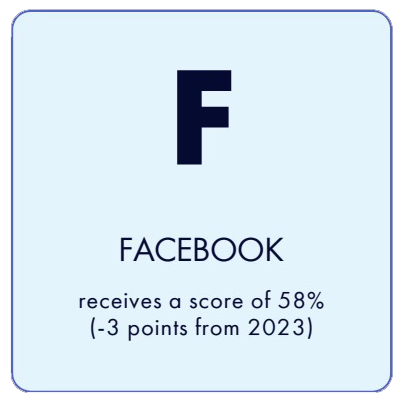
Facebook receives a score of 58, a three-point decrease from its 2023 score. Meta has a policy in place protecting transgender, nonbinary, and gender non-conforming users from targeted misgendering. However, the policy requires self-reporting,[1] does not extend to public figures, and Facebook does not have a similar policy in place that protects users from targeted deadnaming. Facebook also has a comprehensive policy that prohibits advertisers from discriminating against users based on protected characteristics such as sexual orientation and gender identity. According to this policy, advertisers may not use Meta’s audience selection tools to “wrongfully target specific groups of people for advertising,” “wrongfully exclude specific groups of people from seeing their ads,” and “include discriminatory content in their ads.”
Meta’s policies fail to adequately protect LGBTQ users in several other key areas. Facebook currently does not have a policy prohibiting targeted deadnaming. While Meta’s “Gender Identity Policy and User Tools” policy discloses a training held in 2022 that educated content moderators on enforcement of the company’s gender identity policy, it is not clear whether the company has conducted a similar training in the last year. Facebook continues to provide little transparency regarding the options users have to control the company’s collection and inference of user data related to their sexual orientation and gender identity. The company’s transparency report continues to disclose limited data on the number of pieces of content and accounts restricted for violations to policies protecting LGBTQ users from hate, harassment, and discrimination.
Key Recommendations:
- Give LGBTQ users full control over the company’s handling of user information related to sexual orientation and gender identity: Meta should provide users with clear options to control the company’s collection and inference of user information related to their sexual orientation and gender identity.
- Protect transgender, nonbinary, and gender non-conforming users (including public figures) from targeted deadnaming: The company should adopt a comprehensive policy that prohibits targeted deadnaming on Facebook, explain in detail how this policy is enforced, and should not require self-reporting (the company should also update its targeted misgendering policy to not require self-reporting, and to protect public figures). The company should also disclose that it employs various processes and technologies — including human and automated content moderation — to detect content and behaviors violating these policies.
- Publish comprehensive data on how policies protecting LGBTQ users are enforced: The company should regularly publish data on the actions it has taken to enforce policies protecting LGBTQ users, and break out this data by different sub-policies.












